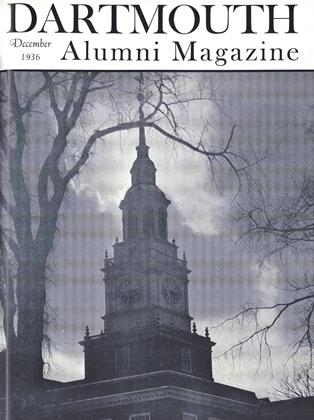By Sydney A: Clark '12, Robert M. McBride and Company, p. 289. $2.50.
Any American bent on traveling for sheer enjoyment during this winter season will have to do a lot of "shopping around" to find a gay spot and a carefree people either in Europe or Asia. Mr. Clark, experienced in world travel both in the fifty dollar class and otherwise, sensed well in advance that such was to be the case and forthwith proceeded to pioneer again those well known highways and byways of pleasure in nearby Cuba. His book is refreshing to the memory of those who know Cuba, stimulating and instructive to those who would choose to refresh themselves under the constant Cuban sun, and even the fireside traveler will need only to have a bottle of Bacardi within easy reach for his complete refreshment.
No pretensions of a complete Cuban tapestry are intended for the author makes it plain that he is weaving no fabric to display the sordid and sad aspects of Cuban life. His warp is one of good humor, gaiety, and loveliness. Even poverty-stricken towns and people charm the reader because Mr. Clark permits only the underlying strands of hopefulness and good cheer to thread his loom.
Any description of Cuba must of necessity be built around its capitol city and to many people, Cuba is Havana or Havana is Cuba, the conclusion remaining the same no matter how you turn it. Mr. Clark has gone to some pains to remedy this current notion by achieving a careful balance in his tapestry between the provincial and the urban. As a matter of fact his treatment of provincial life will strike the experienced reader as being more natural and lively than the somewhat stereotyped pictures in and about Havana.
The reader is impressed with the fact that Mr. Clark is trying to keep away from his guide book propensities but is not quite successful in many instances. He spoils some perfectly fine pictures of his own when his more simple statements are compounded with the usual Terryistic terminology. These slips from grace, however, are admirably concealed ofttimes by the flowing style of his narrative.
For the reader with a historical turn of mind Mr. Clark will be popular because the book is a veritable store of information about the early visitors to the island and many of these anecdotes take on a new sparkle under his pen. Of course the American occupations come in for their share—Karl Decker and Evangelina Cisneros become young again, and the strenuous T. R. comes to life as a brave soldier and a gentleman but not the hero of San Juan Hill.
Viewed comprehensively Cuban Tapestry proves itself to be a tolerably good descriptive narrative about our too often maligned southern neighbor mainly due to the fact that the author is sufficiently cosmopolitan to approach his topic in the spirit of friendliness and appreciation.
 View Full Issue
View Full Issue
More From This Issue
-
 Sports
SportsFollowing the Big Green Teams
December 1936 By ROBERT P. FULLER '37 -
 Article
ArticleGradus Ad Parnassum
December 1936 By The Editor -
 Class Notes
Class NotesClass of 1911
December 1936 By Prof. Nathanie. G. Burleigh -
 Class Notes
Class NotesClass of 1931
December 1936 By Edward D. Gruen -
 Class Notes
Class NotesClass of 1910
December 1936 By Harold P. Hinman -
 Class Notes
Class NotesClass of 1929
December 1936 By F. Willian Andres
Ralph A. Burns.
Books
-
 Books
BooksSamuel W. McCall, Governor of Massachusetts
November, 1916 -
 Books
BooksSOVIET STRATEGIES IN SOUTHEAST ASIA.
JULY 1966 By ERNEST P. YOUNG -
 Books
BooksQUICK GUIDE TO THE WORLD'S MOST FAMOUS RECIPES.
FEBRUARY 1970 By JOAN HIER -
 Books
BooksTHIRTY-ONE SONNETS.
OCTOBER 1967 By JOHN HURD '21 -
 Books
BooksWAY FOR AMERICA
April 1943 By Royal Case Nemiah -
 Books
BooksEASTERN EUROPE: POLITICS, REVOLUTION AND DIPLOMACY.
DECEMBER 1970 By WILLIAM J. MILLER




